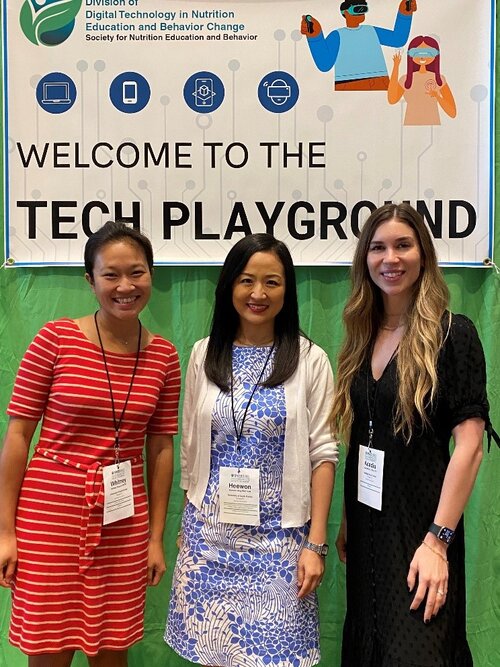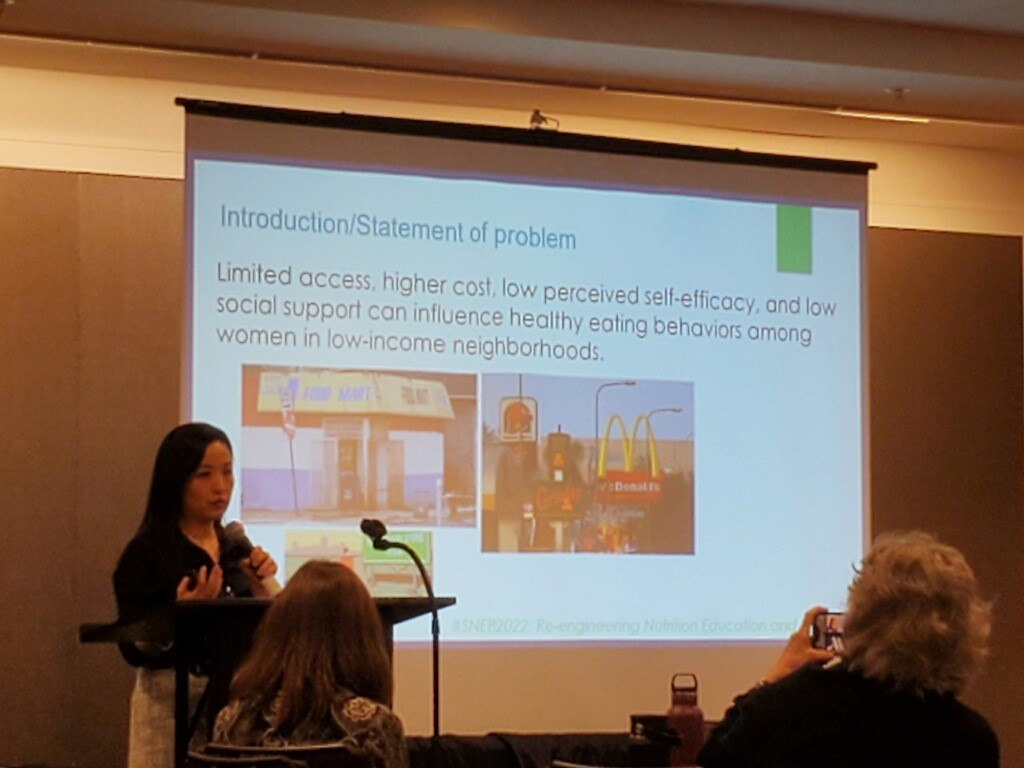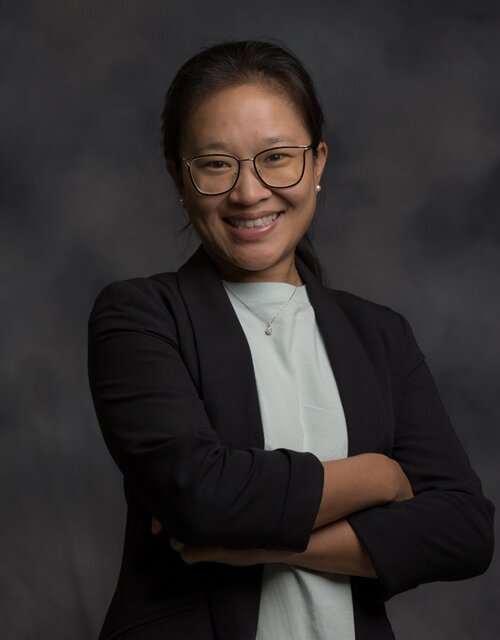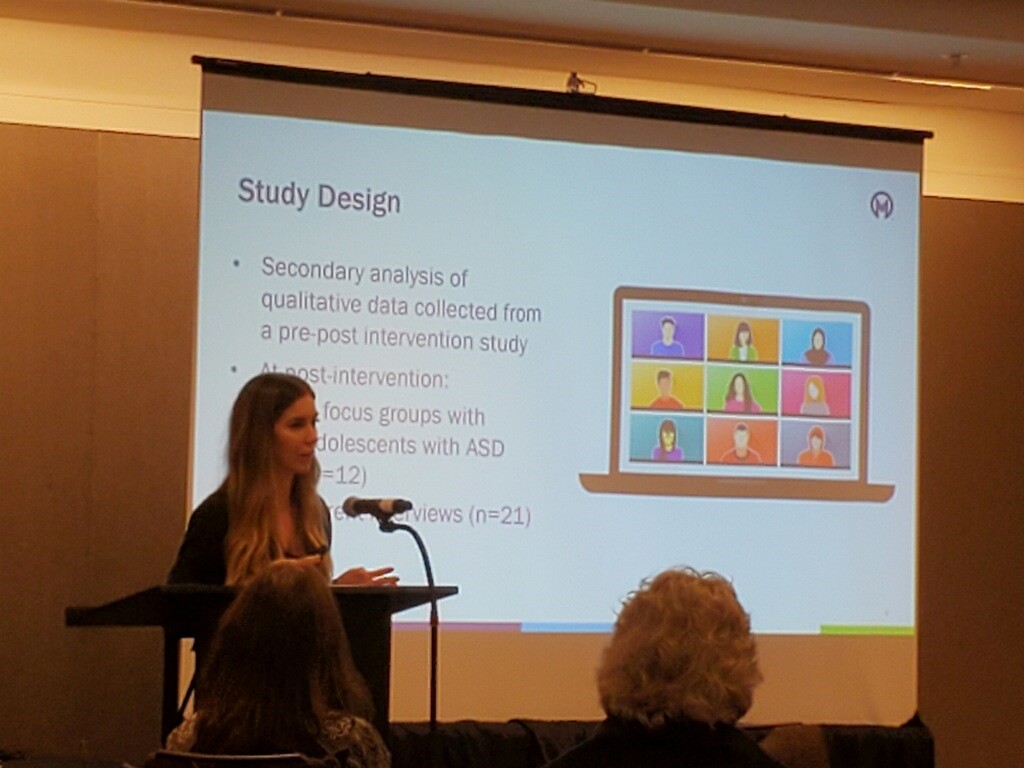USF COPH shines at international nutrition conference
USF College of Public Health’s Dr. Heewon Gray, associate professor specializing in nutrition, and COPH PhD alumnae Drs. Acadia Buro and Whitney Fung Uy attended the Society of Nutrition Education and Behavior’s (SNEB) annual conference in Atlanta in July to share their research with a global group of attendees who came to learn more about current nutrition education and behavior research.

Fung Uy was also awarded the 2022 SNEB Korean Society of Community Nutrition Student Award at the event, an award presented to SNEB members who have made “significant contributions to the field of community nutrition, especially for Korean Americans and/or minority populations within the U.S.”
The SNEB promotes “effective nutrition education and healthy behavior,” and the international conference draws worldwide professionals working at the “research, practice and policy nexus relational to nutrition and behavior change,” according to their website.
Buro and Fung Uy both earned their PhDs from the COPH in community and family health.
“The main theme of this year’s conference was ‘Re-engineering Nutrition Education and Behavior – Designing tech competence in your digital world.’ The goal/intention of the conference was to ‘discuss tech equity, technology and the food system, technology in the scholarship of teaching and learning, and integrating technology across the research spectrum.’ I enjoyed learning about many different studies using technology in nutrition education research,” Gray said.
Using social media to promote better nutritional choices
Gray presented her research, “Social Media Nutrition Education Integrated With a Home Food Delivery Assistance for Low-income Pregnant Women: A Pilot Study,” published in the Journal of Nutrition Education and Behavior, which shared the feasibility of implementing a social media nutrition education intervention that integrated Facebook posts/interactions and home food delivery for pregnant women in underserved neighborhoods.

“The intervention was 6-weeks long and included weekly Facebook posts: a lesson video, goal-setting prompts, a cooking demonstration, healthy pregnancy and safe baby content, and a weekly survey,” Gray said. “Cooking ingredients were home-delivered every week by the local food bank. We conducted a mixed methods study using a series of questionnaires and semi-structured interviews.”
Gray said she worked alongside an interdisciplinary team including Dr. David Himmelgreen, professor and director of the Center for the Advancement of Food Security and Health Communities at the USF Department of Anthropology, and Dr. Deborah Austin from the community partner, REACHUP, Inc.
Feeding Tampa Bay, a local food bank, arranged and provided the food assistance component for the intervention.
“It was surprising that parents indicated that they really enjoyed cooking demonstrations in our intervention, and they wanted to have a longer intervention than 6 weeks,” Gray said. “Some participants expressed that they tried spinach and cucumber for the first time and enjoyed making dishes using new ingredients. Our results indicated that participants did more meal-planning practice, reduced intake of sweetened beverages and improved their perceived eating habits after the intervention.”
Gray said social media tools can be useful to remotely implement nutrition education interventions, especially for pregnant women in low-income neighborhoods.
“Nutrition education in pregnancy is important because poor diet quality during pregnancy is associated with adverse pregnancy outcomes, so healthy eating behaviors during pregnancy may improve health outcomes of both women and infants,” she said. “Using social media for the nutrition intervention was innovative, and our study indicated that it was feasible to implement nutrition education through social media, which was especially helpful during the COVID-19 pandemic. Learning from this project, we adapted the social media component for my current nutrition education intervention project.”
Supporting newcomers to food assistance
Fung Uy has been working in the nutrition, anti-hunger and food assistance area for almost 10 years now, and her work has grown into a balance involving research, practice and policy.
“I am extremely passionate about my research and feel confident that it can inform policymakers and also support community initiatives. Because of my research and work, I can be a better advocate for good food and a healthy life for all,” Fung Uy said.

She presented her research, “Experiences of New Visitors Seeking Emergency Food Assistance Due to the COVID-19 Pandemic,” which has also been published in the Journal of Nutrition Education and Behavior.
“Because emergency food assistance is critical in helping people become food secure, my study explored the aspects that food assistance impacted participants’ food availability, access, utilization and stability over time,” she said.
Fung Uy said the most interesting revelation of the research was hearing the participants’ experiences through the in-depth interviews, as they were seeking food assistance for the first time ever.
“Often, participants were embarrassed or uncomfortable seeking assistance, but after a few visits, they mostly felt welcomed by volunteers and staff and were grateful for the assistance,” she said. “In the study sample of 18 people, many were directly affected due to COVID, whether it was because of job or income loss, or sometimes it was fear of COVID-19 exposure and getting their family sick. As a result of financial struggles, they had to seek food assistance.”
She said participants reported often having foods they did not know how to use or did not prefer to eat.
“For example, they often received large amounts of eggplants or squash, or they received food in the pre-packed boxes that their family was allergic to. Some participants learned how to use what they got, but what was most surprising from this group was that they ended up giving those foods away and ‘made do’ with less food or found ways to buy what they needed,” she said.
This research was manuscript one of three of Fung Uy’s dissertation research, and she is in the process of submitting the remaining two. This is a topic area she said she hopes to continue focusing on to better support families that cannot afford sufficient food.
“Emergency food assistance through food banks and pantries is a critical piece of the safety net to support families who do not have enough food. People who are food insecure are more likely to have limited incomes, lower educational attainment and unaffordable housing. By working with and conducting research among the emergency food assistance system, we can provide recommendations on how to increase access to healthy food for people seeking food assistance,” she said.
SNEB Korean Society of Community Nutrition Student Award
Fung Uy earned recognition at the conference for her work as a student on the USF campus for the Campus Food Waste Recovery Project and as a community advocate for sustainable food systems.
“I have been a member of the Society of Nutrition Education and Behavior since 2013, so it is a humbling experience for me to receive the award from professionals in my field. As grateful as I am, the award is also another bonus for inspiring me to continue to be an advocate in my community,” she said.
She’s currently a post-doctoral fellow with The Gretchen Swanson Center for Nutrition (GSCN), a nonprofit research institute providing expertise in measurement and evaluation to help develop, enhance and expand programs focused on healthy eating and active living. The GSCN also works to improve food security and healthy food access and promote local food systems while applying a health equity lens.
“I am thrilled to learn from top researchers in my field as I continue my postdoc training with GSCN. I hope to continue learning and becoming a better leader to fight for a healthy, equitable and sustainable food system for our future,” she said.
Reducing ultra-processed food consumption in adolescents with autism
Buro shared findings from two analyses related to her dissertation on an intervention she developed for adolescents with autism spectrum disorder (ASD).

“The intervention, BALANCE, aims to improve long-term healthy eating habits in adolescents with ASD through eight weekly 45-minute, interactive group sessions,” she said.
The goal of the first analysis was to assess whether ultra-processed food (UPF) intake and diet quality in adolescents with ASD changed after the 8-week virtual nutrition education intervention, and findings indicated some improvements in UPF consumption and diet quality. Results varied based on participants’ baseline UPF consumption. This is a quantitative analysis of data collected from a pre-post intervention study with 22 adolescents with ASD ages 12-21 years.
Findings from the original study have been published in Autism andJournal of Nutrition Education and Behavior.
“I also presented a qualitative analysis of data collected during the same study. The goal was to optimize a theoretical framework based on empirical data from the virtual nutrition education intervention study for adolescents with ASD,” Buro said.
Buro said the long-term goal of her research is more widespread implementation of lifestyle interventions to improve health and quality of life among vulnerable adolescent and young adult populations.
“It was surprising to see differences in diet quality and ultra-processed foods with such a small sample size. For the framework analysis, self-regulation, autonomy and family support emerged as factors important for improving healthy eating that were overlooked in the initial framework development,” she said.

Buro said the next step for this line of research is to seek funding to conduct a pilot randomized controlled trial of the BALANCE intervention to assess behavioral and metabolic outcomes.
She’s currently a T32 Postdoctoral Fellow in the Department of Health Outcomes and Behavior at Moffitt Cancer Center focusing on developing a new independent line of research to adapt and pilot a lifestyle intervention for young adult cancer survivors.
“My next goal is to obtain a faculty position and continue my research on behavioral interventions for vulnerable and under-resourced communities,” she said.
Abstract citations
To read more about the research noted above, reference the full citations below:
Buro, A.W. & Gray, H.L. (2022, July). O01 Optimizing a Theoretical Framework for Virtual Nutrition Education Programs for Adolescents with Autism Spectrum Disorder. [Abstract] Journal of Nutrition Education and Behavior, 54 (7), S1. Presented at the Society for Nutrition Education and Behavior conference.
Buro, A.W. & Gray, H.L. (2022, July). P073 Diet Quality and Ultra-processed Food Consumption Before and After a Virtual Nutrition Intervention for Adolescents with ASD. [Abstract] Journal of Nutrition Education and Behavior, 54 (7), S52. Presented at the Society for Nutrition Education and Behavior conference.
Fung Uy, W., Lillpopp, R.A., Martinez Tyson, D., Himmelgreen, D., Wright, L., & Gray, H.L. (2022, July). P058 Experiences of New Visitors Seeking Emergency Food Assistance Due to the COVID-19 Pandemic. [Abstract] Journal of Nutrition Education and Behavior, 54 (7), S45-S46. Presented at the Society for Nutrition Education and Behavior conference.
Gray, H.L., Gwaltney, K., Darnal, S., Jones, K., Hayes, N., Graham, M., Tapales, R., Crocker, T., & Himmelgreen, D. (2022, July). O02 Social Media Nutrition Education Integrated With a Home Food Delivery Assistance for Low-income Pregnant Women: A Pilot Study. [Abstract] Journal of Nutrition Education and Behavior, 54 (7), S1-S2. Presented at the Society for Nutrition Education and Behavior conference.
Story by Anna Mayor, USF College of Public Health
